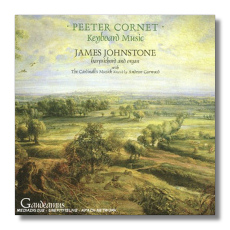
The Internet's Premier Classical Music Source
Related Links
- Latest Reviews
- More Reviews
-
By Composer
-
Collections
DVD & Blu-ray
Books
Concert Reviews
Articles/Interviews
Software
Audio
Search Amazon
Recommended Links
Site News
 CD Review
CD Review
Peeter Cornet

Keyboard Works
- Toccata noni toni
- Fantasia primi toni
- 2 Courantes
- 3 Fantasias octavi toni
- Fantasia secundi toni
- Tantum ergo
- Salve regina
- Fantasia noni toni
- Fantasia quinti toni sopra ut re mi fa sol la
James Johnstone, harpsichord & organ
Academy Sound & Vision Gaudeamus CDGAU335 74m DDD
Reading the excellent notes by the soloist, one is led to believe that it is a miracle that any of Peeter Cornet's music has survived at all. And so it is. This music resurfaced in the 1980's in Poland after it disappeared altogether for almost 250 years. And for 50 years prior to 1941 it was only available from an unreliable microfilm. In that same year, it was transported with other precious material from the Berlin State Library to the Biblioteka Jagiellonska in Kraków, where since the 1980's it has become a matter of strong interest and curiosity.
Cornet's date of birth, like many historical aspects of his life, cannot be ascertained. He was born 'circa' 1560 and was brought up during a time of great political and religious upheaval in the Low Countries. The defeat of the Armada in 1588 brought about an end to Spanish ambitions in the area. By the turn of the century, Brussels had become a centre of religious tolerance and flourishing artistic community and this fact explains Cornet's sudden appearance in Brussels as organist at St. Nicholas and at court.
One of his esteemed colleagues and friends, was Peter Phillips who later became godfather to one of his children. Cornet remained at court until just before his death on the 27th March 1633. He never studied abroad and never composed any vocal music. Consequently he was admired more as a virtuoso than a composer. The pieces on this CD reveal some fresh and inventive works, particularly the Fantasias where moments of spontaneous surprise abound and delight. Although these compositions are no masterpieces, their rhythmic irregularities and rapidly changing textures give them a certain allure.
James Johnston (ably supported by the Cardinall's Musick directed by Andrew Carwood in the 'Salve Regina') despatches these works with grace and affection, giving them the advocacy they deserve. The recording is of the high standards we have now come to expect from this label. Not a show stopper then, but an issue that should arouse a good amount of interest.
Copyright © 2005, Gerald Fenech


















